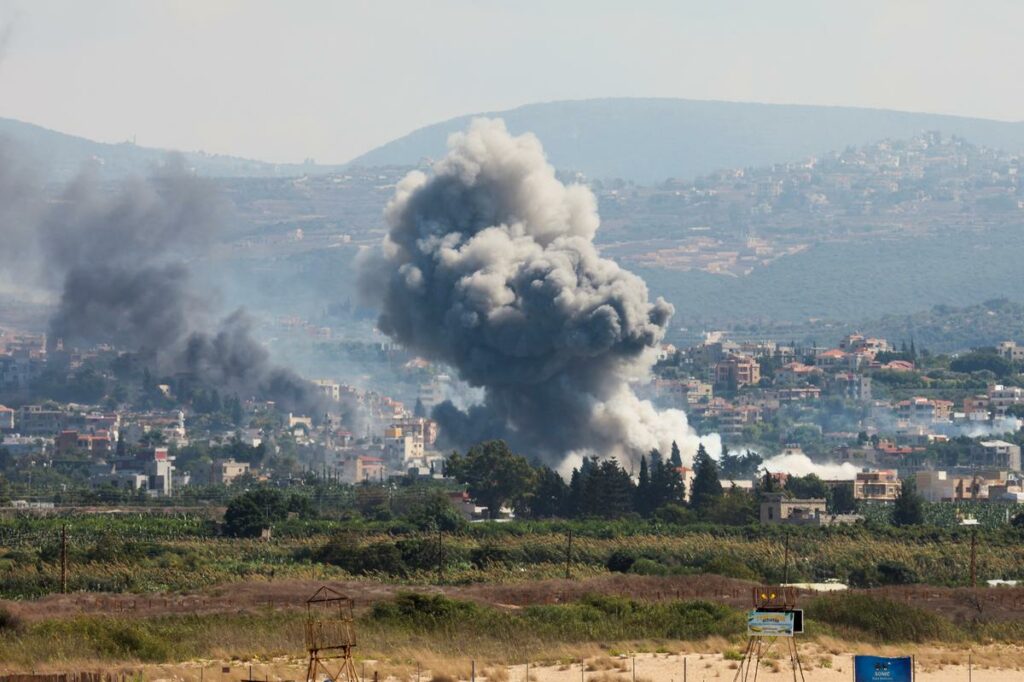The US mediator and presidential envoy Amos Hochstein returned this week to the Middle East in a shuttle diplomacy between Israel and Lebanon to convince both parties to agree to an American proposal for a ceasefire leading to a sustainable diplomatic solution.
Before leaving Beirut, where Hochstein met Nabih Berri, the Shia-Muslim speaker of the Lebanese parliament who also acts as interlocutor to Hezbollah, he sounded optimistic and said that additional progress had been made in the talks in the Lebanese capital. In Israel, where he arrived on Wednesday, government sources expressed cautious optimism.
Even the new Hezbollah leader Naim Kassem, who succeeded Hassan Nasrallah who was assassinated by Israel in a bomb attack against his headquarter in Beirut, said that he accepted the American proposal and that everything now depends on the Israeli government’s response. Contrary to Nasrallah, Kassem did not link a ceasefire in Lebanon to an immediate end of the war in Gaza.
While 80 % of the elements in the proposed deal were said to have been accepted by Lebanon, both Hezbollah and Lebanon’s government rejected the Israeli demand for freedom of action in case of a violation of the deal by Hezbollah. In their view, it would be an infringement of Lebanon’s sovereignty.
Israel has been promised an American guarantee for freedom of action but insists on including it in the agreement with Lebanon which could derail the talks on a ceasefire.
The enforcement of the deal in making is key but there are remaining differences about the composition of the international force which will supervise and enforce the deal. The UN peace keeping force in southern Lebanon, UNIFIL, turned a blind eye to Hezbollah’s military build - up close to the border with Israel, in violation of UN Security Council Resolution 1701 from 2006.
Instead, the deal proposes a new international force with troops from Germany and France but Lebanon prefers troops from Arab countries such as Egypt and Jordan. The Lebanese government is expected to impose its will on Hezbollah. The government army, after reinforcement and training by among others the EU, will ensure that Hezbollah withdraws from southern Lebanon in line with the UN resolution.
Ideally, Lebanon would also regain its independence by disarming Hezbollah, which is armed by Iran and acts as its main proxy in the region, and banning any militia besides the government army. Iran seems to support the American proposal and has told Lebanon to accept it, fearing that Hezbollah will lose much more if the war continues.
According to Israel, most of Hezbollah’s political and military leadership has been eliminated, 3,000 of its foot soldiers have been killed and 70 – 80 % of its firepower has been destroyed. Still, it seems to have recovered and is capable of launching 50 - 100 missiles and drones every day against northern and central Israel, though most of them are intercepted or crash in open areas.
The proposal outlines three phases, starting with a 60-days ceasefire during which Hezbollah would completely withdraw from southern Lebanon. In next phase, Israel would withdraw from southern Lebanon, where it currently has reached the second line of Hezbollah positions and weapon storages in villages ca 7 km from the border.
In the third phase, the deal would form the basis for the exact marking of the land border between Israel and Lebanon. Hezbollah has justified its attacks as “resistance” against Israel’s occupation of a strip of land, the so-called Sheeba Farms, which it considers to be Lebanese territory. It started the war in solidarity with Hamas but by now the war has spiraled out of control and has spilled over to Iran.
EU’s position
In his press remarks after the Foreign Affairs Council meeting on Monday, outgoing High Representative Josep Borrell said briefly that, "On Lebanon, Member States were considering a ceasefire, asking for it to take place quickly”.
Asked for a clarification, Peter Stano, EU’s lead spokesperson for foreign affairs, replied that the EU supports all initiatives aimed at achieving a ceasefire as soon as possible in Lebanon, especially the US and French diplomatic efforts.
A key point in any diplomatic solution is whether the mandate for UNIFIL should be strengthened or a new international force should supervise and enforce the agreement. Did the Foreign Affairs Council discuss EU’s role in the solution?
“The Foreign Ministers in the latest Council meeting reiterated the readiness of the EU to provide the necessary support to Lebanon, its armed forces and to UNIFIL,” he replied. “Regarding the role of UNIFIL, any change of its mandate would need to be adopted by the UN Security Council.” EU remains committed to fully supporting UNIFIL in its current formation and mandate which has been defined by a decision of the Security Council.
The EU itself is not a member of the Security Council and any initiative to revise the mandate must come from the EU member states. He added that Josep Borrell will discuss all these issues during his visit to Beirut this week. He has already arrived in Jordan, where he focused on EU’s bilateral relations with Jordan and the humanitarian situation in Gaza. The ceasefire in Lebanon was apparently not on the agenda.
At his last Foreign Affairs Council meeting, Borrell proposed a suspension of the political dialogue with Israel. The proposal sent a political signal but was mainly symbolic as both sides had agreed to convene the EU-Israel Association Council meeting. After the meeting, Borrell said that, "Most of the member states considered that it was much better to continue having a diplomatic and political relationship with Israel”.
This might change after the pre-trial chamber of the International Court of Justice in the Hague on Thursday rejected Israel’s legal challenges and issued warrants of arrest for Prime Minister Netanyahu and former defense minister Gallant for alleged war crimes and crimes against humanity, accusing them of intentionally directing an attack against the civilian population in Gaza.
The court decision vindicates Borrell’s repeated statements since the war started that one horror (Hamas murderous terrorist attack against Israel on 7 October 2023) does not justify another horror (the use of disproportionate force, the massive destruction in Gaza and the insufficient delivery of humanitarian aid in violation of international humanitarian law).


